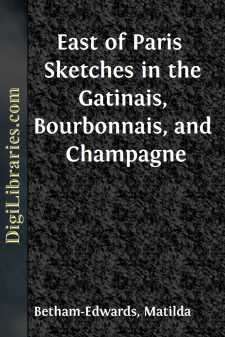Categories
- Antiques & Collectibles 13
- Architecture 36
- Art 48
- Bibles 22
- Biography & Autobiography 813
- Body, Mind & Spirit 142
- Business & Economics 28
- Children's Books 14
- Children's Fiction 11
- Computers 4
- Cooking 94
- Crafts & Hobbies 4
- Drama 346
- Education 46
- Family & Relationships 57
- Fiction 11828
- Games 19
- Gardening 17
- Health & Fitness 34
- History 1377
- House & Home 1
- Humor 147
- Juvenile Fiction 1873
- Juvenile Nonfiction 202
- Language Arts & Disciplines 88
- Law 16
- Literary Collections 686
- Literary Criticism 179
- Mathematics 13
- Medical 41
- Music 40
- Nature 179
- Non-Classifiable 1768
- Performing Arts 7
- Periodicals 1453
- Philosophy 64
- Photography 2
- Poetry 896
- Political Science 203
- Psychology 42
- Reference 154
- Religion 513
- Science 126
- Self-Help 84
- Social Science 81
- Sports & Recreation 34
- Study Aids 3
- Technology & Engineering 59
- Transportation 23
- Travel 463
- True Crime 29
East of Paris Sketches in the Gatinais, Bourbonnais, and Champagne
Description:
Excerpt
CHAPTER I
MELUN
Scores upon scores of times had I steamed past Melun in the Dijon express, ever eyeing the place wistfully, ever too hurried, perhaps too lazy, to make a halt. Not until September last did I carry out a long cherished intention. It is unpardonable to pass and re-pass any French town without alighting for at least an hour's stroll!
Melun, capital of the ancient Gatinais, now chef-lieu of the Department of Seine and Marne, well deserves a visit. Pretty as Melun looks from the railway it is prettier still on nearer approach. The Seine here makes a loop, twice curling round the town with loving embrace, its walls and old world houses to-day mirrored in the crystal-clear river. Like every other French town, small or great, Melun possesses its outer ring of shady walks, boulevards lying beyond the river-side quarters. The place has a busy, prosperous, almost metropolitan look, after the village just left. [Footnote: For symmetry's sake I begin these records at Melun, although I halted at the place on my way from my third sojourn at Bourron.] The big, bustling Hotel du Grand Monarque too, with its brisk, obliging landlady, invited a stay. Dr. Johnson, perhaps the wittiest if the completest John Bull who ever lived, was not far wrong when he glorified the inn. "Nothing contrived by man," he said, "has produced so much happiness (relaxation were surely the better word?) as a good tavern." Do we not all, to quote Falstaff, "take our ease at our inn," under its roof throwing off daily cares, assuming a holiday mood?
A survey of the yard awoke another train of reflections. It really seems as if the invention of the motor car were bringing back ante-railway days for the tourist and the travelling world, recalling family coach and post-chaise. The place was crowded with motor cars of all shapes and sizes, some of these were plain, shabby gigs and carts of commercial travellers, others, landaus, waggonettes and victorias of rich folks seeing the world in their own carriage as their ancestors had done generations before; one turn-out suggested royalty or a Rothschild, I was about to say, rather I should name a Chicago store-keeper, since American millionaires are the Haroun-el-Raschids of the twentieth century. This last was a sumptuously fitted up carriage having a seat behind for servants, accommodating eight persons in all. There was also a huge box for luggage. It would be interesting to know how much petroleum, electricity, or alcohol such a vehicle would consume in a day. The manufacture of motor cars must be a very flourishing business in France, next, I should say, to that of bicycles. Of these also there was a goodly supply in the entrance hall of the inn, and the impetus given to travel by both motor car and bicycle was here self-evident. The Hotel du Grand Monarque literally swarmed with tourists, one and all French folks taking their ease at their inn. And our neighbours do not take their pleasure solemnly after the manner of the less impressionable English....




